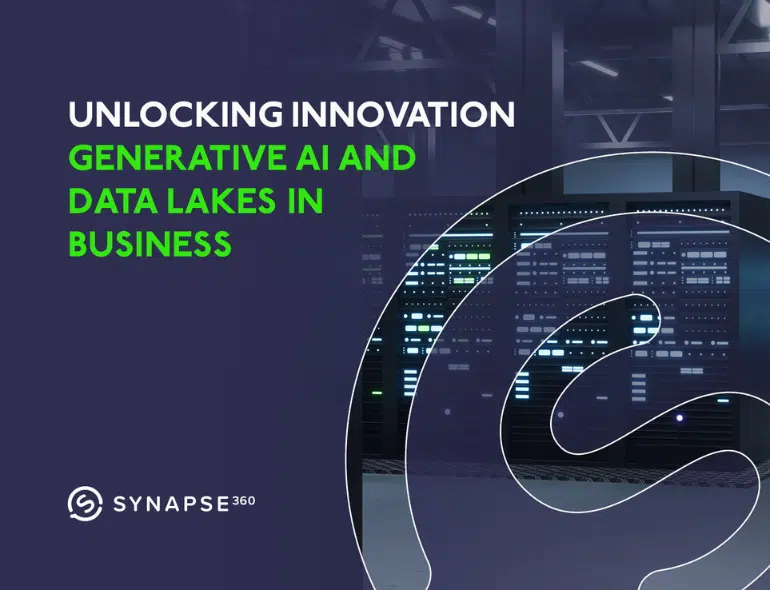Businesses across various sectors—from e-commerce giants to healthcare providers—rely heavily on data to innovate and maintain a competitive edge. However, the sheer volume of data can make it challenging to extract meaningful insights efficiently. This is where generative AI comes into play, revolutionising how businesses leverage their data lakes to uncover hidden opportunities and drive creativity.
Understanding the Data Lake Landscape
Before diving into the role of generative AI, it’s essential to understand what a data lake is. A data lake is a centralised repository that stores vast amounts of raw data in its native format until needed. Unlike traditional data warehouses, data lakes allow organisations to ingest both structured and unstructured data from various sources without extensive pre-processing. This flexibility enables businesses to capture a comprehensive view of their operations and customer interactions.
The Power of Generative AI
Generative AI, a subset of artificial intelligence, focuses on creating new content—whether text, images, or music—based on patterns learned from existing data. By analysing vast datasets, generative AI algorithms can identify correlations, generate realistic simulations, and even predict future trends with remarkable accuracy.
Enhancing Data Lake Insights
- Pattern Recognition: Generative AI algorithms excel at recognising complex patterns within datasets, uncovering correlations that may elude human analysts. By identifying hidden relationships between seemingly unrelated variables, businesses gain valuable insights into customer behaviour, market trends, and operational inefficiencies.
- Content Generation: Beyond analysis, generative AI enables businesses to generate new content based on existing data. Whether crafting personalised marketing messages or designing product prototypes, generative AI fuels creativity and helps organisations stay ahead of the competition.
- Predictive Analytics: By leveraging historical data, generative AI algorithms can forecast future outcomes and anticipate customer preferences with unprecedented accuracy. From predicting sales trends to optimising supply chain logistics, predictive analytics allows businesses to make informed decisions and adapt proactively to changing market conditions.
- Personalisation and Customisation: Generative AI enables businesses to tailor products and services to individual customer preferences. By analysing vast datasets, companies can create personalised recommendations, curate bespoke experiences, and foster long-term customer loyalty.
Real-World Applications
Generative AI is already making significant impacts across various industries, transforming how businesses leverage their data lakes to drive innovation and creativity.
- Retail: Retailers use generative AI to forecast consumer demand, optimise pricing strategies, and personalise the shopping experience through targeted recommendations and virtual try-on experiences.
- Healthcare: Healthcare providers harness generative AI to analyse medical imaging data, identify anomalies, and assist clinicians in diagnosing diseases with greater accuracy and efficiency.
- Entertainment: Entertainment companies utilise generative AI to create immersive gaming experiences, generate lifelike avatars, and produce personalised content tailored to individual viewer preferences.
- Finance: Financial institutions leverage generative AI to detect fraudulent activities, predict market trends, and offer personalised financial advice to clients.
- Manufacturing: Manufacturers use generative AI to optimise production processes, predict equipment failures, and design innovative products based on consumer preferences.
Challenges of Using Generative AI
While generative AI offers numerous benefits, businesses may face several challenges when implementing this technology:
- Data Quality and Integration: Ensuring high-quality, clean data is crucial for generative AI to function effectively. Integrating data from various sources can be complex and time-consuming.
- Computational Resources: Generative AI models require significant computational power and resources, which can be costly for businesses to maintain and scale.
- Ethical Considerations: The use of generative AI raises ethical concerns, such as data privacy, bias in AI algorithms, and the potential misuse of generated content.
- Skill Gaps: Implementing generative AI requires specialised knowledge and skills. Businesses may need to invest in training or hiring experts to manage and deploy AI solutions effectively.
- Regulatory Compliance: Navigating the regulatory landscape for AI technologies can be challenging, as businesses must ensure compliance with data protection laws and industry-specific regulations.
Conclusion
Generative AI has emerged as a transformative force, unlocking the full potential of data lakes to drive innovation and creativity. By leveraging generative AI, businesses can uncover hidden insights, predict future trends, and deliver personalised experiences that resonate deeply with customers. However, it’s essential to address the challenges associated with this technology to fully harness its benefits.
To explore how generative AI and data lakes can elevate your business, reach out to our team today to find out more.
Call us on 0330 660 0001 or email hello@synapse360.com



